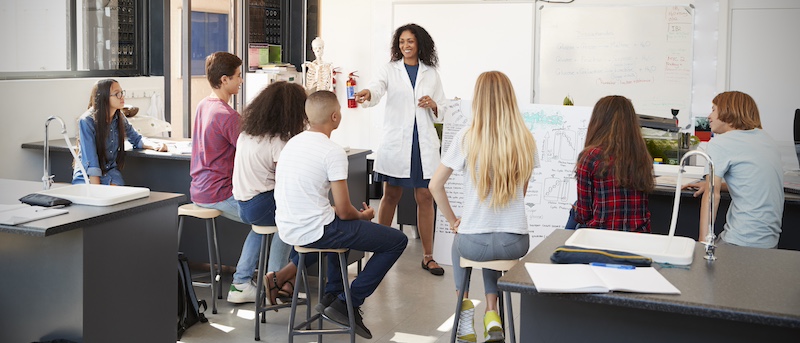Most opportunities in STEM are aimed at high school students, but this doesn’t mean you need to wait until high school to explore your passions. Just as you can begin a sport or start acting in middle school, so too can you begin your exploration of science.
In this article, we’re going to explore one option for doing so, the Young Scientist Lab. We’ll cover what the lab is, what options there are for students, how you can get involved, and whether this opportunity is right for you. Let’s get started!
All About the Young Scientist Lab
Founded as a partnership between 3M and Discovery Education, the Young Scientist Lab seeks to provide resources and do-it-yourself experiments for students and educators in grades K-8.
They have three main ways you can get involved with science:
- Science at home: these are simple experiments you can do using materials you have around your home. They are meant to introduce younger students to what science is, and what scientists do. These are mainly meant for students in elementary school, but middle school students can have fun with them as well.
- Instructional materials: These are lesson plans meant for teachers or parents who want to introduce scientific concepts to their students. These are organized by grade level, with more advanced options available for older students, and simpler options for the younger. These are also a great resource for homeschooled students.
- The Young Scientist Challenge: This is the preeminent offering of the Young Scientist Lab, and one the brightest students should take advantage of. Students enter a video, and the winner receives a $25,000 prize, and a mentorship opportunity with a 3M scientist.
While the first two opportunities are somewhat self-explanatory, we’ll dive deeper into the Young Scientist Challenge, so you can learn how to get involved.
What is the Young Scientist Challenge
Held yearly, the Young Scientist Challenge is open to students in grades 5-8. Students submit a 1-2 minute long video in which they describe a new invention or solution that could impact an everyday problem that impacts them, their family, or their community. This is for individual students; you may not make submissions as a pair or part of a group.
The challenge opens in December each year, and closes in April. Finalists are announced in June. The Final Event is held in October, with winners announced. There are ten finalists, all ten are invited to participate in a Summer program under the mentorship of a 3M scientist, where they work to create a prototype of their solution.
The finalists are then invited to present their prototypes and work from the summer program at the Final Event. The overall winner is chosen at this event, and receives a $25,000 prize. All of the top 10 finalists receive a $1,000 prize, and additional prizes are awarded to merit finalists from each state. There is another prize for the school with the most entrants to the contest.
You must be a student in 5th through 8th grade at a school or homeschool in the US, and a legal resident in order to enter the contest. You must have your parent’s permission to enter (because you are a minor).
You are not judged on the quality of the video, but on the content. You are free to film on a cellphone or other handheld camera. Your school or local library may also have cameras you can use. You may not use music in your video unless it was created by you, or you have permission from the creator to use it (for legal reasons).
You can view examples of past finalists’ videos on their site, from the grand winner, to finalists, to the state merit finalists. Submission standards do change slightly each year, but what they are looking for doesn’t. Specifically, your video is judged based on this rubric:
- Creativity (30%), having a novel idea or new approach to a problem is key.
- Scientific knowledge (30%); you need to apply real STEM principles for your solution, not theoretical technology.
- Persuasiveness and effective communication (20%); you need to show that you did research, and clearly explain how your solution works with your problem.
- Overall presentation (20%); this does not refer to the video quality, but to your presentation on the topic, and how it inspires others to your point of view.
This illustrates what they are looking for; projects at a high level for middle school students. They are not expecting you to complete original research or build prototypes on your own, but they do want to see your enthusiasm for and understanding of scientific principles.
What specific challenge you decide to address is up to you, but it should be something you have a reasonable understanding of, and your solution should be based on scientific principles, and not rely on undiscovered technology.
Should You Participate in the Young Scientist Challenge?
If you are in middle school, and have an interest in science or engineering, then this challenge is a wonderful opportunity for you. While there are an increasing number of ways to get involved with science in high school, there are fewer of this caliber available to younger students.
This challenge, in and of itself, will not impact your college admissions chances. Colleges generally do not care about what you did during middle school, and do not want you to list these activities on your activities list (unless it’s an activity you’ve been doing continuously, such as gymnastics from the ages of five through seventeen). That does not mean this is pointless however.
Middle school students are still exploring their interests, and deciding what they like enough to devote their time and energy to. This opportunity is a great way for these students to start learning the difference between being interested in science, and doing science. Being interested in science involves reading articles or watching videos, while doing it lets you take a mere interest to new heights.
Even if you do not win the competition, the experience of researching a problem and devising a solution is a good one. It allows you to think about the world the way a scientist or engineer does, and can spark deeper interests in students. There are no shortage of issues that can have novel and technological solutions, and young students are uniquely positioned to find and execute them.
Overall, if you have an interest in science or engineering as disciplines, then you should consider taking on the young scientist challenge. Doing things is a step beyond learning about them, and expands students horizons in new ways. The benefits for winners are just another reason to apply.
Final Thoughts
There are scarcer opportunities for middle school students to get involved in their interests, but they are out there. Students of all ages benefit from exploring their passions and learning new things. We hope this article has given you a solid introduction to the possible benefits of the Young Scientist Lab, and how you can take advantage of it.
If you are interested in pursuing other interests for younger students, or working towards the transition to high school, we can help. We have worked with younger students to begin exploring their interests early, discovering what they love to do, and helping them find their passions. Schedule a free consultation to learn how we can help you.








